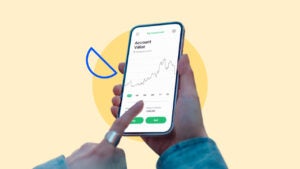10 best money-making apps in 2025

Key takeaways
- There are a variety of apps available for individuals to earn money through different means, such as cash back on purchases, completing tasks and providing services.
- Many of these apps are free to use, but some may charge a subscription fee or take a percentage of earnings.
- By utilizing money-making apps, individuals can make extra cash in their spare time, and potentially even turn it into a full-time income.
Money-making apps put seemingly endless opportunities for how to make money right at your fingertips. On your respective mobile app store, you’ll find options tailored to a wide range of individuals, from skilled freelancers and caregivers to those who prefer completing simple tasks or love getting cash back rewards.
Best apps to make money
| App | Best for |
|---|---|
| Rakuten | Cash back online |
| Ibotta | Cash back in-store |
| Upside | Cash back on gas |
| Depop | Selling clothes |
| Swagbucks | App-based tasks |
| TaskRabbit | Local tasks |
| Fiverr | Freelancing |
| Survey Junkie | Taking surveys |
| UrbanSitter | Babysitting |
| Rocket Money | Saving on bills and subscriptions |
1. Rakuten: Best for cash back on online purchases
Rakuten is an app that earns you cash back for shopping at more than 3,500 stores online. It works by partnering with different stores and getting paid a commission for sales, which is then shared with the customer in the form of cash back.
Some popular brands that Rakuten partners with include Macy’s, StubHub and Best Buy. A few stores come with the opportunity to earn over 10 percent cash back on purchases.
You can earn cash back by shopping through the Rakuten app or downloading the Rakuten browser extension. It’s also possible to collect earnings from in-store purchases by linking a card to Rakuten in the app and then using the linked card to pay in-store. Earnings are paid out four times a year, and they can be distributed by check or PayPal.
Rakuten has 3.5 out of 5 stars in the Google Play store and 4.8 out of 5 stars in the App Store.
- Cost: Free
- How you make money: Cash back on purchases
Pros
- Free
- $30 bonus for friend referrals
- Unlimited cash back available for online and in-person shopping
Cons
- Payouts are only made quarterly
- Most stores have exclusions for items that don’t earn cash back
2. Ibotta: Best for cash back on in-store purchases
Ibotta offers cash-back rewards on purchases made online and in stores, much like Rakuten. A unique feature of Ibotta, though, is its abundance of earnings opportunities for in-store purchases.
If you have loyalty cards at certain retailers, you can link them to the Ibotta app to earn cash-back rewards whenever you shop at the retailer. Another way to earn cash back is by submitting a receipt from stores Ibotta partners with; when you buy certain products listed in the app, you receive cash back on the purchase. You can also opt-in to Nearby Offer Alerts, which send notifications to your mobile phone whenever you’re near an Ibotta retailer.
You can even earn cash back for grocery shopping at a number of popular grocery stores, including Foodtown, Kroger and Trader Joe’s.
Instead of earning points and then redeeming accumulated points, you get direct cash for each qualifying purchase within 24 hours. You can withdraw earnings whenever you reach $20, which can then be converted into a gift card or transferred to a bank account via PayPal.
Ibotta has 4.6 out of 5 stars in the Google Play store and 4.8 out of 5 stars in the App Store.
- Cost: Free
- How you make money: Cash back on in-store and online purchases
Pros
- Earning cash back from in-person shopping is easy and widely available
- Unlimited cash back for in-store and online shopping
Cons
- You need to earn at least $20 and redeem at least one offer before you can withdraw earnings
- For online shopping, transactions only qualify if you shop through the Ibotta app
3. Upside: Best for cash back on gas
With Upside, you can earn cash back for a big expense for many drivers: gas. The app makes it easy to find eligible gas stations through its interactive map, and you simply claim a cash-back offer in the app before you pay.
According to the app’s website, if you spent $200 on gas in a month, you’d earn about $4 in cash back. Plus, you can earn cash back at certain restaurants and grocery stores through the app.
To cash out, you can connect a bank account or PayPal, or use earnings to buy a gift card. However, there’s a $1 fee if you cash out less than $15 through Paypal or less than $10 to a bank account. Payouts process within one or two days.
Upside has 4.6 out of 5 stars in the Google Play store and 4.8 out of 5 stars in the App Store.
- Cost: Free
- How you make money: Cash back on gas purchases, and for some restaurants and grocery stores
Pros
- You can earn cash back on everyday gas purchases.
- Some restaurants and grocery stores are also eligible for earning cash back.
- The app offers a helpful map to find eligible gas stations nearby.
Cons
- You need at least $10 for bank transfers and $15 for PayPal transfers to avoid a $1 cash-out fee.
- Cheaper gas stations may not be eligible for cash back – it’s important to compare options to ensure you’re getting a good deal.
4. Depop: Best for selling clothes
With Depop, users can sell their old clothes and accessories. Depop began as a social network for younger creatives to connect with new designers. Today, the app is a widespread online marketplace that boasts about 35 million registered users.
Anyone can create an account with Depop to list items, and the app offers seller services to teach users the ins and outs of selling on the online marketplace. Once listed, an item can be liked or bookmarked by potential buyers, and there’s a messaging service embedded in the app so buyers and sellers can communicate. Sellers also have the option to offer international shipping.
In addition to clothing, there are a variety of categories including homeware, sports equipment and magazines.
Depop has 4.6 out of 5 stars in the Google Play store and 4.8 out of 5 stars in the App Store.
- Cost: Free for users based in the U.S.
- How you make money: Selling clothing and accessories
Pros
- Anyone can sell on the app in a variety of categories
- Buyers and sellers can communicate through an in-app chat service
Cons
- Shipping procedures and options can be confusing for some users
5. Swagbucks: Best for app-based tasks
Swagbucks is a one-stop shop for earning monetary rewards on various tasks. Tasks you can make money on through the Swagbucks app include watching promotional videos, playing games, completing surveys and shopping online. You can also earn rewards for buying certain groceries — you just snap a picture of the receipt after shopping and upload it to the app.
For each task you complete, you’ll earn a certain amount of points. Then, the points can be redeemed for gift cards to popular retailers, a check or cash via PayPal. Every 100 points equals $1, and Swagbucks states that users typically earn $1 to $5 per day.
Swagbucks has 4.5 out of 5 stars in the Google Play store and 4.4 out of 5 stars in the App Store.
- Cost: Free
- How you make money: Completing various app-based tasks
Pros
- There are many different ways to earn rewards, including taking surveys, playing games, watching videos or shopping at eligible retailers.
- Points can be redeemed for cash or turned into gift cards.
Cons
- Rewards are typically quite low.
- It can take up to 10 business days to receive rewards.
6. TaskRabbit: Best for local tasks
TaskRabbit could be a good option for someone looking to take on the odd job here and there to make extra cash at their own rate. The app connects service providers — called Taskers — to clients who need a helping hand in their local area. Some of the services that you can offer on TaskRabbit include furniture assembly, yard work, grocery shopping and moving help.
Signing up to become a Tasker is relatively simple — you download the app, select the services you want to offer and complete a verification process. You set your own availability and rates. There is, however, a one-time $25 registration fee for Taskers to use the app.
TaskRabbit has 3.4 out of 5 stars in the Google Play store and 4.8 out of 5 stars in the App Store.
- Cost: $25
- How you make money: Completing tasks for local clients
Pros
- Users can take on tasks on their schedule for a number of different categories.
- You set your own rate.
Cons
- There’s a $25 registration fee, though it’s only a one-time fee.
- There may be fewer tasks available in less urban areas.
7. Fiverr: Best for freelancers
Fiverr is an app designed to connect a variety of entrepreneurs and businesses with freelancers. Freelancers, called sellers in the app, can offer services in hundreds of categories, such as website design, copywriting and data engineering.
To become a seller with Fiverr, you must first create an account and undergo an onboarding process, which involves watching a few instructional videos. You’ll then provide information regarding your skill set, work history and identity verification. Fiverr will review the information to determine whether you are approved to become a seller.
Once approved, sellers can create gig packages, which are three tiers of the service offered. The seller determines the price of each tier and can offer services on their own schedule. Payment is electronically dispersed to the seller as soon as the order is completed, though it takes up to two weeks to clear, unless you’re a top-rated seller. Sellers keep 80 percent of the payment while Fiverr takes a 20 percent cut.
Fiverr has 4.4 out of 5 stars in the Google Play store and 4.9 out of 5 stars in the App Store.
- Cost: 20 percent of payment per gig
- How you make money: Freelance work
Pros
- There are many service options for freelancers.
- Fiverr holds the funds from buyers before you deliver a service, so that you don’t have to worry about buyers owing you money.
Cons
- Fiverr takes a large cut of payments – 20 percent.
- It typically takes two weeks for earnings to clear.
8. Survey Junkie: Best for taking surveys
Survey Junkie rewards you for sharing your opinions and digital activity. After you sign up with the app, it will match you with surveys that you can complete on your own time and earn points for. You can also earn points by adding the Survey Junkie Pulse extension to your browser, which shares your digital browsing activity (such as shopping activity and website engagement) with market researchers.
Points can then be redeemed for cash via PayPal or gift cards with popular retailers, as long as you have a minimum of 500 points ($5) to redeem.
Survey Junkie states that all data collected from both survey responses and digital activity are encrypted and collected directly by the researchers. Users can choose what they want to share to maintain privacy.
Survey Junkie has 4.3 out of 5 stars in the Google Play store and 4.5 out of 5 stars in the App Store.
- Cost: Free
- How you make money: Taking surveys and sharing digital activity
Pros
- Earning money is easy by taking surveys and sharing data.
- You only need $5 worth of points to redeem them — some apps have much higher minimums to redeem earnings.
Cons
- Payouts can be low for surveys.
- For Survey Junkie Pulse, some users may not be comfortable sharing their digital data.
9. UrbanSitter: Best for babysitters
UrbanSitter is a platform that connects families with providers of child care, backup care, pet sitting, senior care, housekeeping and tutoring services in hundreds of cities across the United States. To become a care provider on the app, you sign up with your availability, set your own rate and complete a background check. Clients must verify their identities, too, so that both parties are safe.
The national average rate charged by babysitters on UrbanSitter for one child is $23.61, according to the site, though each sitter decides their own rate. UrbanSitter charges an annual membership fee, though it doesn’t specify the amount of the fee on its site.
UrbanSitter has 3.4 out of 5 stars in the Google Play store and 4.8 out of 5 stars on the App Store.
- Cost: Annual fee (for caregivers and clients)
- How you make money: Babysitting
Pros
- It’s easy to find local babysitting gigs.
- Babysitters set their own rates and hours.
- Babysitters keep 100 percent of their earnings.
Cons
- There’s an annual fee, which the site does not specify.
- Not all locations may have babysitting gigs available.
10. Rocket Money: Best for saving on bills and subscriptions
Rocket Money offers a unique way to save money: cutting back on recurring payments. It does this by analyzing your bills and subscriptions, canceling unwanted subscriptions and negotiating to lower bills for you.
Additionally, Rocket Money comes with several other features to help users manage their personal finances. Some of these include a spending tracker, automated savings and credit score alerts.
The Rocket Money app itself is free, but if it successfully negotiates a bill for you, it takes a percentage of the savings for the first year. Users can choose for the service to charge between 35 and 60 percent of earnings from negotiated bills.
Rocket Money has 4.6 out of 5 stars in the Google Play store and 4.4 out of 5 stars on the App Store.
- Cost: 35 to 60 percent of negotiated bill savings for the first year
- How you make money: Canceling unwanted subscriptions and negotiating bills
Pros
- Rocket Money can cancel subscriptions and negotiate bills for you, lowering longer-term costs and boosting savings.
- A number of other savings features are included, such as a spending tracker.
Cons
- The service takes a 30 to 60 percent cut of savings from bill negotiations.
- There’s no guarantee that any bills will be lowered.
Bottom line
When choosing a money-making app, it’s important to see if the effort involved is worth it for you. For example, some people may find the payments for completing surveys too small for the time spent, while others are happy to earn a few bucks in their spare time.
That said, some money-making apps offer better earning potential for certain activities and skills. A cash back app can be a great fit for frequent shoppers, while marketplace apps work well for those with lots of items to sell or in-demand services to offer.
It’s all about finding an app that offers enough value relative to your lifestyle priorities and alternative money-making opportunities. If you find an app that works for you, be sure to check for fees and confirm it’s a trusted platform to avoid potential scams.
Frequently asked questions
-
While money-making apps are generally safe, it’s important to do research before using any app. Check reviews and ratings, read terms and conditions, ensure the app uses secure payment methods and contact the app’s customer support with any questions or concerns.
-
The best money-making app will depend on your expectations. Money-making apps are most likely not going to make you rich, but they do provide a wide range of opportunities to earn some extra cash, whether that be making a few bucks answering surveys while chilling on the couch or leveraging your skills as a freelancer to generate supplemental income.Finding the best app for you may take some trial and error, so be sure to frequently reflect on whether the time and effort required feels worthwhile based on the payout or reward.
-
Making $100 a day online is not likely with money-making apps that reward cash back or pay you for completing simple tasks, like surveys.For example, Swagbucks states that the average user makes $2 to $5 a day completing its app-based tasks. If your goal is to earn $100 a day online, you may want to consider money-making apps where you set your own rate for providing a skilled digital service, such as website design on Fiverr.
— Freelance writers Dori Zinn and David McMillin contributed to updating this article.
Why we ask for feedback Your feedback helps us improve our content and services. It takes less than a minute to complete.
Your responses are anonymous and will only be used for improving our website.
You may also like

Top 5 ETF categories to watch in 2025

The best cash back apps of 2025

9 game apps that help you make money



